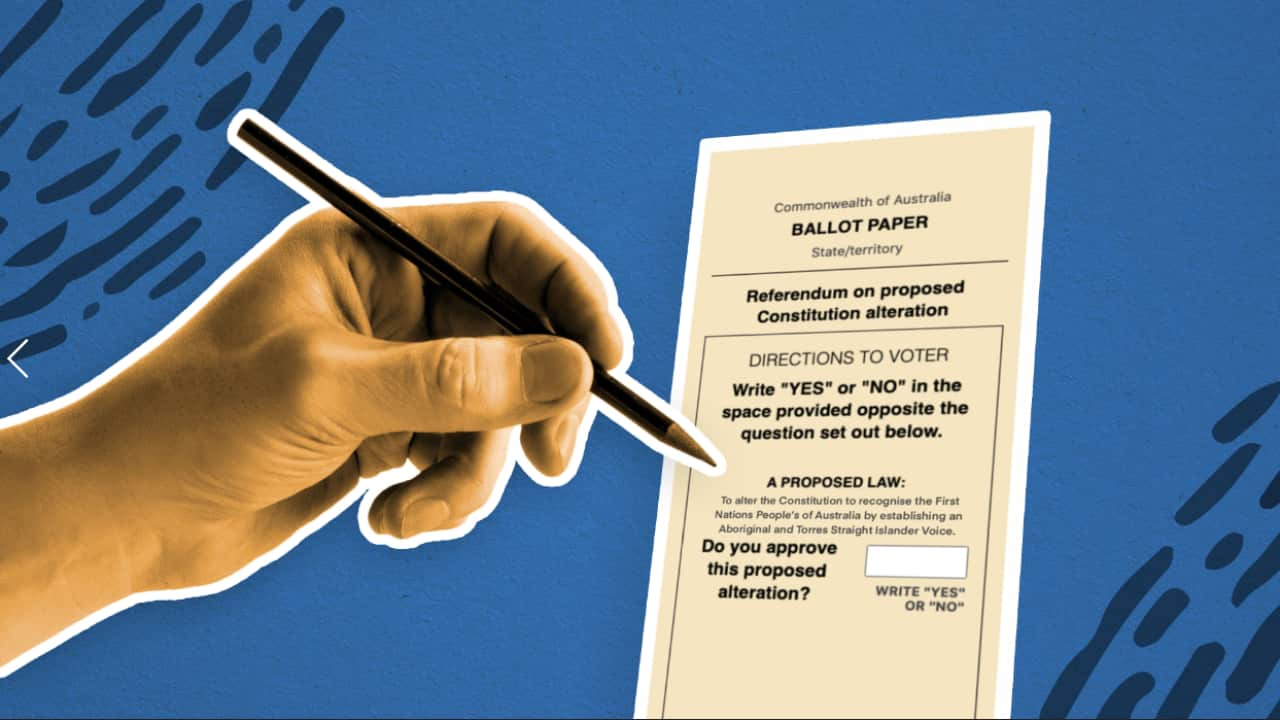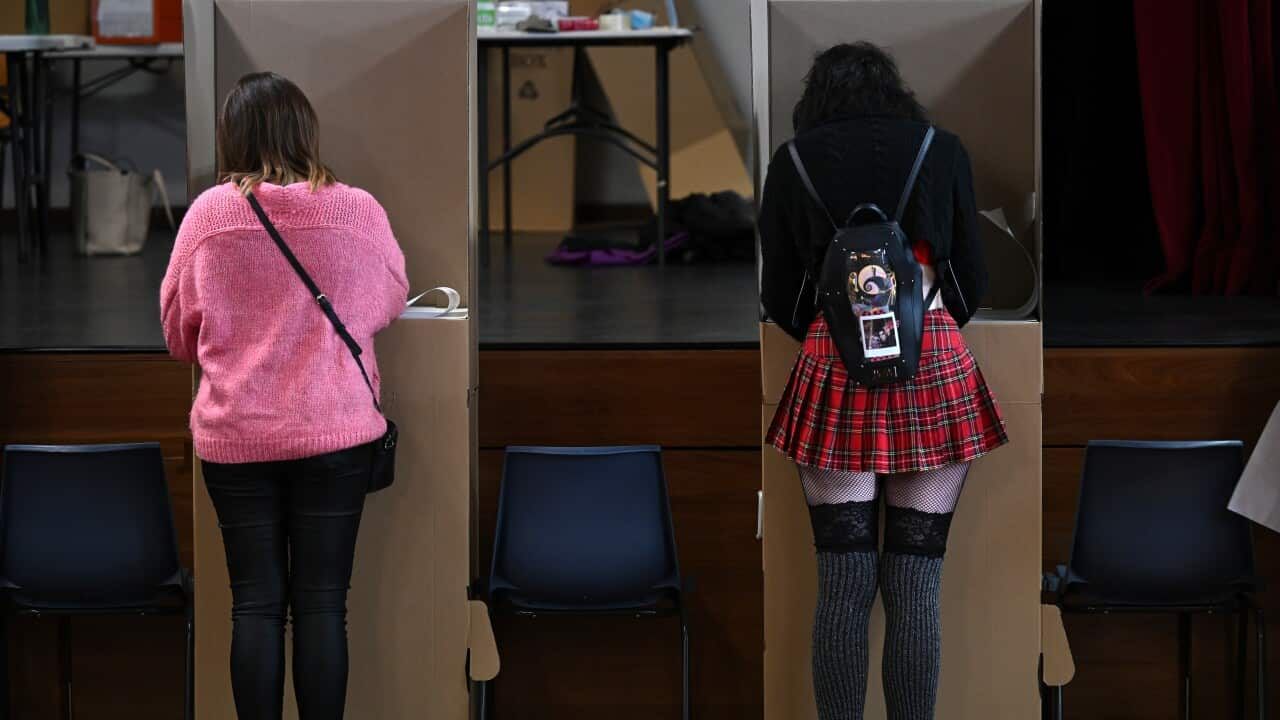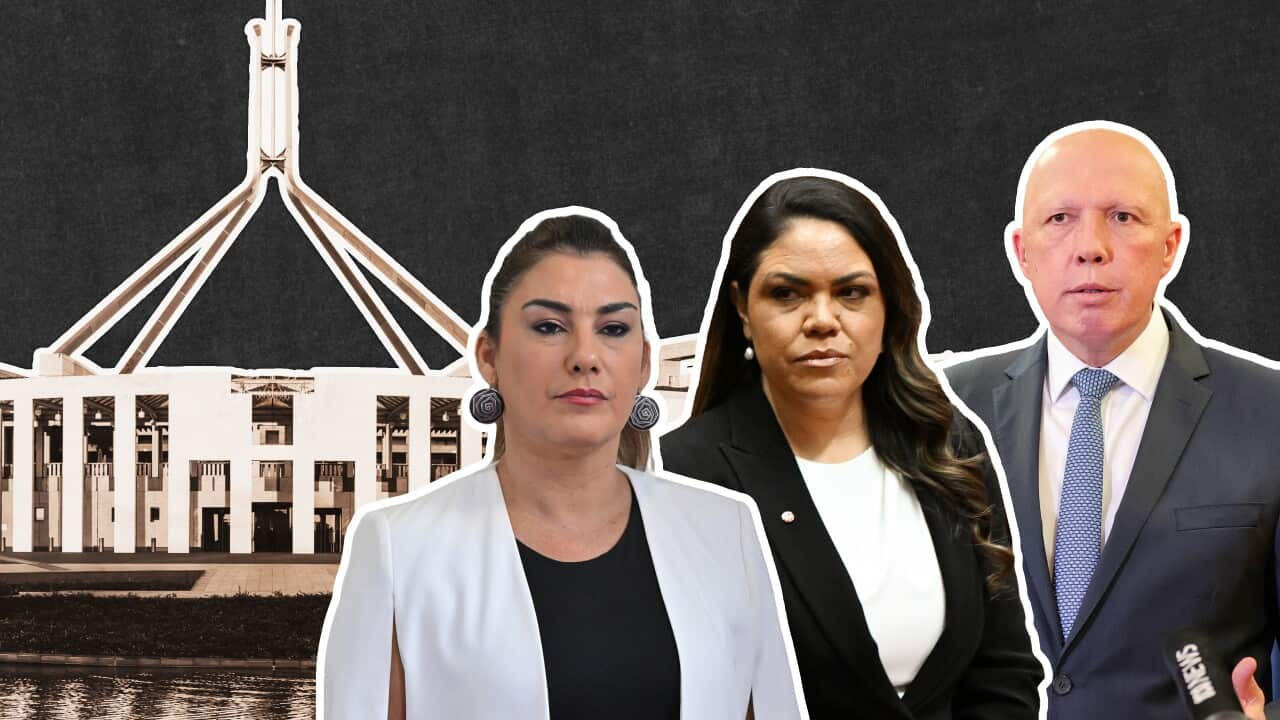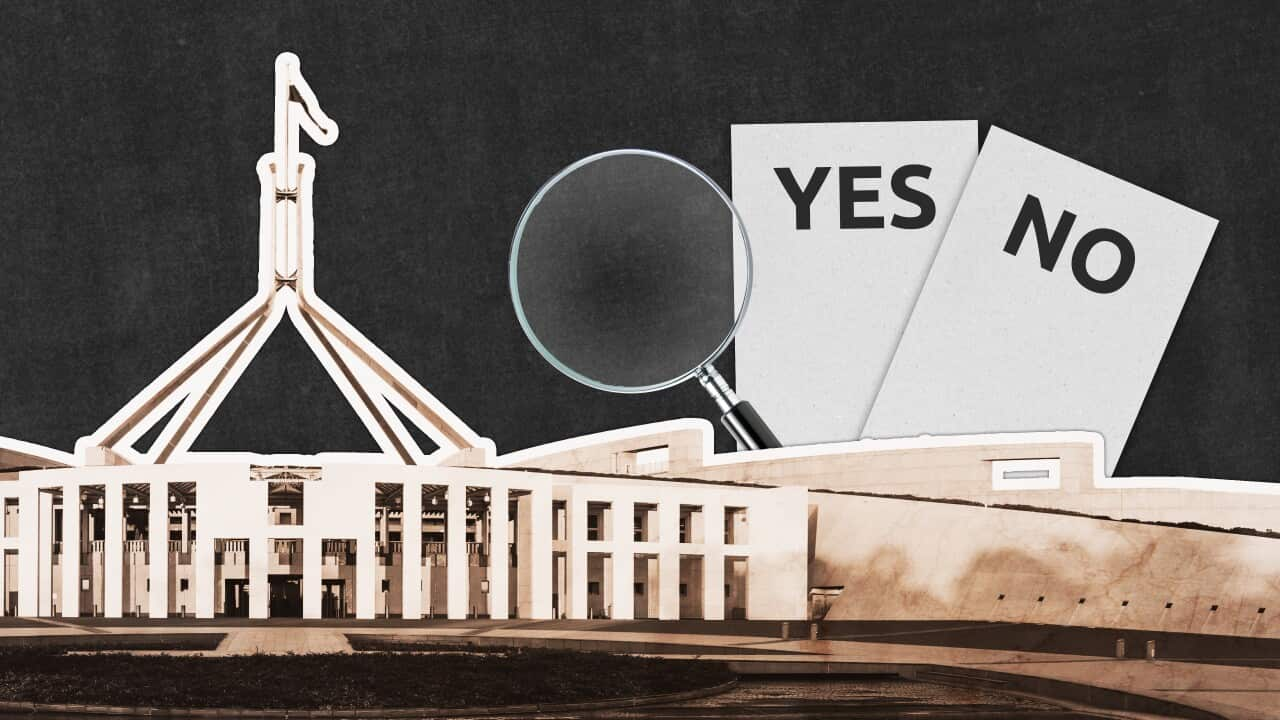Nishadh Rego is on a mission to create safe spaces for his community to talk about what he calls an “important moment for Australia”.
Over the past two months, he and Khushaal Vyas have been organising information sessions and holding Instagram chats over cups of chai about the Indigenous Voice to Parliament.
The two Sydneysiders are co-convenors of Desis for Yes, a volunteer collective of South Asian Australians supporting the Voice. Their aim? To educate their community in the lead-up to the 14 October referendum.
“Our purpose is really to provide a safe space for the conversation so that people in the community are going into this referendum with information, and voting in an informed way,” Rego told SBS News.
Rego came to Australia as an international student in 2006 and is now a citizen. He believes the South Asian diaspora largely shares a “common experience of colonialism” with First Nations Australians, and can understand the importance of a constitutionally enshrined Voice.
‘People are increasingly interested in this referendum'
Since setting up Desis for Yes, Rego says engagement with the Voice among South Asian Australian communities has increased.
“From what we’re hearing, people are increasingly interested in what this referendum is about and want opportunities to ask the questions,” he said.
Anecdotally, he said those engaging with Desis for Yes are already voting Yes and want to know how to take further action, or are undecided and looking for more information.
The collective is using their social media channels, working with diaspora media outlets and - most importantly, Rego says - bringing community leaders together for conversations.
In late July, they ran a workshop with the Walking Together project, run by not-for-profit youth organisation Youth Off the Streets. Around 60 leaders from South Asian communities turned up.
“At that initial conversation, people committed to then running their own conversations in their community and in their space,” Rego said.
Around 10 more sessions are scheduled across Sydney in the coming month, with interest also in South Australia and Victoria.
The volunteer group is among those advocating at a grassroots and organisational level to reach their culturally and linguistically diverse (CALD) communities.
Dor Akech Achiek is the settlement services manager at Settlement Services International (SSI), a not-for-profit which supports people from diverse backgrounds, including those who are newly arrived to Australia.
From South Sudan, Achiek is also a community leader, having arrived in Australia as a refugee two decades ago.
He also believes people from migrant and refugee backgrounds largely feel a “synergy” with the Voice given their own histories and experiences.
“At this historic crossroads in our nation’s history, it is critical that our organisation and other community groups - who may have a great level of experience, connection and trust - do step up to play a critical role in giving people information," he said.

Dor Akech Achiek is the settlement services manager at Settlement Services International (SSI). Source: Supplied / SSI / Karl Schwerdtfeger
Achiek maintains their work widely aims to “educate people to make an informed decision on the Voice”. This includes working with staff members, who are largely from CALD communities, and frontline staff who may be engaging with clients with voting rights.
Migrant organisations largely support the Voice - but some opposition remains
In late May, more than 110 migrant and cultural community organisations
The groups signed a joint resolution asking all Australians to work together to ensure the referendum’s success. At time of writing, the resolution has support from over 180 organisations.
Carlo Carli, president of the Federation of Ethnic Communities’ Councils of Australia (FECCA), said organisations in CALD communities “have largely come on board with the Yes campaign”.
“There is very little evidence that there are significant groups - whether they be religious, cultural or welfare groups - who have gone for the No campaign," he said.
He said while the Yes campaign is “extraordinarily broad”, “there isn’t the equivalent level of community campaigning or activity coming [from the No campaign]”.
Jamal Daoud leads the Multicultural Voices Against the Voice group. but says the Voice should be a legislated body and not enshrined in the Constitution.
Daoud says he is concerned about a lack of engagement with migrants, and is pushing for a commitment "to create a voice for other marginalised groups - including ... [those from] a non-English speaking background”.
“This is our main message - that we also need a voice,” he said.
FECCA has from Voice opponents, such as prominent No campaigner Warren Mundine, as “divisive” and “offensive”.
Daoud says his group includes people from different migrant backgrounds, and is using pre-existing networks to organise activities, such as community forums, in the lead up to the vote. These have focused on western Sydney.
He said the group has organised activities "in coordination with Fair Australia", .
Fair Australia is led by the Opposition's Indigenous Australians spokesperson Jacinta Nampijinpa Price, a Warlpiri-Celtic woman. It lists Mundine, a Bundjalung man, businessman and former Coalition candidate, as a public spokesperson.
It's understood the group is not related to Fair Australia.
Daoud said Mundine attended two forums, but maintains the group is separate.
Daoud said he believes people are increasingly seeing the importance of participating in the debate. But he is receiving “worrying messages” that No supporters “do not want to be on the frontline as they don’t want to be seen as racist”.
Daoud was a candidate for the United Australia Party at the 2022 federal election.
Carli acknowledged that while Yes campaigners are prepared to speak publicly, “it is very hard to find the equivalent in the No campaign”.
“People are not prepared to come out in a public way,” he said. “So the debate circulates more as channels of concern and gossip rather than a genuine debate.
“It’s not so different from ethnic communities as it is in the general Australian [population].”
He said there has been a “level of switching off” among communities, which he puts down to the intensity of the debate and other issues people are facing, such as cost of living.
“But people are working really hard. And I think people are now engaging - now the date is there, people will engage more and more.”
A spokesperson for the Yes23 campaign, perhaps the most prominent campaign in support of the Voice, said engaging with multicultural communities is a "major focus" of its work.
"We want all Australians to have the facts when they vote later this year. That’s why we will be making sure our ethnic and cultural communities are educated and have factual information about what is being proposed in this referendum," they said.
They said the campaign has partnered with five other organisations to translate sheets, social media tiles and video explainers in over 45 languages, and has "over 100 multicultural ambassadors who are helping the campaign engage with a variety of ethnic communities across Australia".
Price's office has been contacted for comment.
How is the AEC translating Voice material?
The Australian Electoral Commission (AEC) says it looks "very carefully" at translating materials for non-English speakers and engaging with community groups and local organisations.
AEC spokesperson Evan Ekin-Smyth said it has used Australian Bureau of Statistics data to review which languages were most correlated to people not speaking proficient English.
"In the translation space, we carefully look at what languages we translate into ... We ended up with what I think is one of the largest bodies of translation across the public service in terms of communication campaigns," he said.
The AEC has including fact sheets on the referendum, how to cast a formal vote and how to spot myths and disinformation.
It has also , which contain an official guide on the vote and Hard copies of the booklets have been landing in Australian mailboxes in English since the pamphlets were published in July.
The referendum booklet has so far been translated into six First Nations languages: Eastern Arrernete, East Side Kriol, Ngaanyatjarra, Pitjantjatjara, Yolngu Matha and Tiwi. More translations will be available progressively throughout September.
Guides on how to enrol are also available in three African languages - Swahili, Somali, and Tigrinya.
Advertising material is also translated, and we "get into advertising channels in language where we can," Ekin-Smyth said.
Alongside translations, it runs media briefings, including members of CALD media, along with “community engagement sessions” in language in every state and territory.
The AEC’s translator service phone line has had approximately 700 calls in the week since the .
Ultimately, those working in this space believe a grassroots and tailored approach is crucial to reaching CALD communities.
“[Community leaders] have deep connections and roots in communities,” Achiek said.
Rego agrees.
“People need to hear it from those that they trust, and in spaces they’re comfortable with - whether it’s a local community centre, mosque or temple. It’s easier to hear a message in those spaces because you feel safe and comfortable.”
This story was produced in collaboration with SBS Hindi, with additional reporting from Madeleine Wedesweiler.
Stay informed on the 2023 Indigenous Voice to Parliament referendum from across the SBS Network, including First Nations perspectives through NITV.
Visit the to access articles, videos and podcasts in over 60 languages, or stream the latest news and analysis, docos and entertainment for free, at the .













